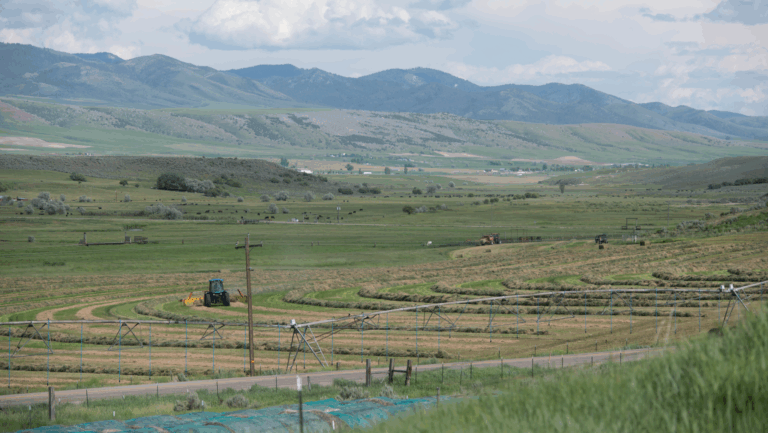What Farmers Should Know About the Ocean Shipping Reform Act
The Ocean Shipping Reform Act was signed into law on June 16, 2022, in an effort to address shipping bottlenecks for U.S. exports.
Since the onset of the COVID-19 pandemic, the U.S. agriculture industry has faced shipping bottlenecks and increases in shipping prices that are impacting global trade and food prices—and shrinking the profits of American farmers and ranchers. As a result, new legislation was introduced in both the House and the Senate to address these backlogs.
The House version of the Ocean Shipping Reform Act (OSRA) was first introduced in August 2021. This version was later consolidated into the America COMPETES Act, which was passed by the House in February and the Senate in March of 2022. However, the Senate version of OSRA was passed by the House on its own and signed into law by the President in June 2022, prompting Congress to resolve discrepancies in the America COMPETES Act before going to the President to be signed into law as well.
Many in the agricultural community are voicing their support for this bipartisan legislation as a positive step towards addressing the logistical bottlenecks they continue to face. Continue reading to learn more about how OSRA will impact farm operations across the U.S.
Why OSRA?
According to Congress, the main goal of OSRA is “to promote the growth and development of U.S. exports through an ocean transportation system that is competitive, efficient, and economical.”
Shipping bottlenecks in the last few years have created costly consequences for American farmers and ranchers, such as:
- Agricultural exporters have lost 22 percent of sales due to ocean shipping delays over the last few years.
- From before the pandemic to September 2021, shipping rates increased from $1,300 to $11,000 for a 40-foot container.
- Recently, shipping issues led to an estimated $25 billion loss in ag exports, according to the American Farm Bureau.
As a result of these issues, there was a need to alleviate shipping bottlenecks, reduce shipping fees, and increase U.S. ag exports.
“[This bill] couldn’t have come at a more needed time for the United States and the world as changes from the Ocean Shipping Reform Act will enable more U.S. agricultural products to reach the global marketplace.”
“[This bill] couldn’t have come at a more needed time for the United States and the world as changes from the Ocean Shipping Reform Act will enable more U.S. agricultural products to reach the global marketplace.”
The Impact of OSRA on U.S. Agriculture
One of the main parts of this law is that it increases the authority of the Federal Maritime Commission to oversee international shipping operations to ultimately benefit U.S. exports.
“The bipartisan Ocean Shipping Reform Act of 2022 aims to level the playing field for American exporters and importers by providing the Federal Maritime Commission (FMC) the tools it needs to improve oversight over international ocean carriers and crack down on rising shipping fees facing consumers.”
Specifically, OSRA prevents detention and demurrage charges deemed unreasonable that common carriers charge.
Fruit and vegetable growers will experience some of the most profound impacts from this legislation as it aims to reduce backlogs that can cause their products to go to waste—which is critical in the effort to reduce food waste.
A key component of OSRA is preventing carriers from refusing to ship U.S. goods in order to reduce the number of empty ships leaving U.S. ports. Between July and December 2020, carriers rejected at least $1.3 billion worth of U.S. ag exports. According to Representative Dusty Johnson, co-sponsor of the bill, “I’ve talked to numerous shippers in the last two weeks, and they have told me things have gotten better just at the prospect of the Ocean Shipping Reform Act.” To avoid the refusal of U.S. imports, the law will ban the unreasonable refusal of cargo space on carriers.
Ultimately, the goal of this legislation is to reduce shipping bottlenecks and reduce shipping costs, therefore helping farmers reduce input costs and get their products to market sooner.
What Industry Groups are Saying About OSRA
As with any legislation, there are opposing viewpoints. However, the voice of support from the agriculture industry is strong for OSRA.
"This legislation empowers the Federal Maritime Commission (FMC) to broadly regulate ocean shipping and ensure the timely delivery of perishable goods at all levels of the fresh produce supply chain. At a time of rising costs and high inflation, we applaud the passage of the Ocean Shipping Reform Act and relief it will ultimately bring to fresh produce consumers and businesses.”
Robert Guenther, Chief Public Policy Officer for the International Fresh Produce Association
“I was pleased to speak personally with President Biden about the urgent need for this legislation last week, and I was proud to join him today as he signed the bill. Addressing congestion at our ports and creating greater accountability for shipping companies is a positive step toward ensuring America’s farmers and ranchers can continue feeding families at home and around the globe.”
“Now, in response to supply chain disruptions caused by a worldwide pandemic and an uneven return to trade normalcy, Congress is hastily lurching forward and possibly opening the door for a return to unnecessary regulatory interference. Like all legislation, the 2022 Ocean Shipping Reform Act states lofty goals and promises improvements for the general public, but the results are likely to be quite different.”
Going forward, time will tell whether this legislation will lead to lasting changes to ease shipping backlogs for American farmers and ranchers.
Stay Up to Date on Ag Legislation Impacting Your Operation
At AgAmerica, we are committed to helping create a thriving future for American agriculture. To accomplish this, we’re revolutionizing the industry by providing resources beyond financial services that help you adapt when necessary and support the long-term success of your operation.
Get trade and industry updates delivered straight to your inbox by signing up for AgAmerica’s newsletter.






